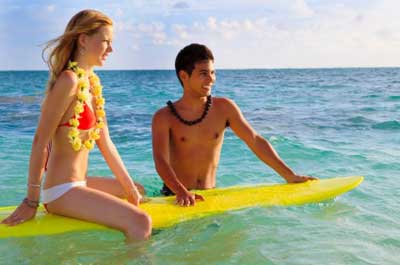(单词翻译:单击)
情景对话
Todd: So, hello, Mitchell, right?
托德:你好,米切尔,你好吗?
Mitchell: Yes. Nice to meet you.
米切尔:我很好。很高兴见到你。
Todd: Nice to meet you. Now Mitchell, you're from Hawaii?
托德:很高兴见到你。米切尔,你来自夏威夷,对吧?
Mitchell: Yes, I am.
米切尔:对,是的。
Todd: That must be pretty cool. What's it like growing up in Hawaii?
托德:那里一定非常凉爽。在夏威夷长大是什么感觉?
Mitchell: Hawaii's really different compared to mainland America. I'm originally born in Ohio, but I moved to Hawaii when I was two. The culture's really different. Since everyone came from different backgrounds, for example, people, Chinese people, Philliphino people, Korean people, they all came from the plantation days. It's a mixed culture, and for example if, my friend's in Hawaii, if I look at one person, I don't know what nationality or race they are, because they have like six races in them.
米切尔:夏威夷与美国内陆地区非常不一样。我是在俄亥俄州出生的,两岁时随家人搬去夏威夷。那里的文化非常不同。因为所有人都来自不同的背景,比如那里有中国人、菲律宾人、韩国人等等,他们都是在种植园时期来到夏威夷的。那里是混合型文化,举个例子,我的朋友在夏威夷,如果我看到他们,我不确定他们的国籍或者是种族是什么,因为他们可能是六个种族的混血。
Todd: Really, yeah.
托德:真的吗?
Todd: Well how about in Hawaii, when you think of Hawaii, what do you think of? Is it weather or food?
托德:那你怎么看夏威夷,提起夏威夷,你会想到什么?天气还是食物?
Mitchell: Weather, food, and beach.
米切尔:是天气、食物和沙滩。
Todd: The beach. OK. Yeah, what island are you from by the way?
托德:沙滩。好,对了,你来自哪个岛屿?
Mitchell: I'm from Ohau.
米切尔:我来自欧胡岛。
Todd: Ohau, OK, so obviously Ohau's more like...
托德:欧胡岛,好,显然欧胡岛是……
Mitchell: Yeah, it's the capital of Hawaii. Honolulu is the capital. Ohau's the most populated island. Our population now is about one million.
米切尔:对,是夏威夷的首府。火奴鲁鲁是夏威夷首府。欧胡岛是人口最密集的岛屿。现在我们那里的人口约有1百万。
Todd: Oh, really. And the whole island is one million.
托德:哦,真的吗?整个岛屿的人口是1百万。
Mitchell: Our own island, that is one million.
米切尔:是我们那个岛的人口是1百万。
Todd: Well, usually how many tourists are actually on the island at the same time?
托德:一般去欧胡岛旅游的人有多少?
Mitchell: I would think at least 20,000.
米切尔:我想至少有2万人。
Todd: Yeah, that's quite a bit.
托德:那真是很多人。
Mitchell: Yeah.
米切尔:对啊。
Todd: Yeah. So in Hawaii is it warm all year round? Sunny, and?
托德:好,那夏威夷是一整年都非常温暖吗?阳光明媚?
Mitchell: Well, the coldest it gets is when you are sleeping in the winter time, it'll hit like 69 degrees fahrenheit and that's when people are throwing on sweaters, the whole like winter.
米切尔:嗯,能感觉到最冷时候应该是冬天睡觉的时候,温度约为69华氏度,所以那时人们都穿上了线衣,整个冬天都是如此。
Todd: The coldest it gets is 70 degrees.
托德:最冷的时候是70华氏度左右。
Mitchell: Right, around like 66 I would think, when you are sleeping.
米切尔:对,我想睡觉的时候大概是66华氏度左右。
Todd: Man, wow, actually, that's farhenheit, that's the American system. How warm is that in centigrade? About 25?
托德:嘿,实际上那是按华氏度算的,这是美国的气温系统。那用摄氏度来表示是多少度呢?25度吗?
Mitchell: 24, 25?
米切尔:24度或是25度吧?
Todd: Maybe, I don't even know. Interesting. What do you think is the best thing about living in Hawaii?
托德:可能是吧,我也不知道。有意思。你认为在夏威夷生活最好的事情是什么?
Mitchell: It'd have to be just the environment itself. There's, you know, everyone's like, we say 'Ohana' means family. Everyone treats everyone like, for example my friend's parents, I call them 'auntie' or something like that because they treat me as like I'm their own kids. It's the culture in general. It's a warm feeling culture. It's like, their not as shady. They'll welome you. When you come in they'll start feeding you food, you know it's like, you're not even hungry and they're feeding you. Also, you can't beat the beach. Surfing, body boarding, body surfing, canoe paddling.
米切尔:我想应该是环境本身。你知道,我们说的ohaha就是指家人。每个人对待其他人都一视如仁,举个例子,我称呼我朋友的母亲为阿姨,因为他们像对待自己的孩子一样对待我。这就是夏威夷的文化,一种能感受到温暖的文化。他们不会那么阴暗,他们会欢迎你。你去到别人家以后,他们就会请你吃饭,其实有时你并不饿,但是他们还是会请你吃饭。当然不能忘了海滩,冲浪、滑浪、人体冲浪还有划艇。
Todd: Ah, man, it sounds pretty good. OK, thanks Mitchelll.
托德:哦,伙计,听起来太棒了。好,谢谢你,米切尔。
Mitchell: No worries. Thank you.
米切尔:不客气。谢谢你。

译文属可可原创,仅供学习交流使用,未经许可请勿转载
重点讲解
重点讲解:
1. grow up
长大成人;成熟;
eg. But eventually, kids grow up and become teens.
但是,孩子终归会成长并步入青少年时期。
eg. The child wish to be a great scientist when he grow up.
这个孩子梦想长大后成为一名伟大的科学家。
2. compared to
相对…而言;对照;
eg. The bank offered to lend us$5000 but it's chickenfeed compared to what we need.
银行提出给我们五千美元贷款,但这笔钱与我们所需要的数目相比是杯水车薪。
eg. His progress at school had been unspectacular compared to his brother.
和弟弟相比,他在学校里的进步很不起眼。
3. think of
想到;想起;想出;
eg. Instead, we tend to think of alumni networks in the context of universities.
说起这样的关系网,我们最先想到的就是大学的校友会。
eg. I can think of two scenarios.
我能想到的有两种情况。
4. by the way
顺便地;附带说一句;
eg. By the way, why not drop in for a drink this evening?
顺便说一句,今晚到我家串门喝一杯怎么样?
eg. By the way, lists are great. They're going to help you out a lot when you are trying to accomplish these goals.
顺便说一句,清单很棒。它们会在你尝试实现这些目标时非常有用。
5. all year round
全年;一年到头;
eg. The rare plant can grow as tall as 60cm and flowers all year round.
这种珍稀的植物能长到60厘米高,而且一年四季开花。
eg. He and his wife are busy all year round .
他和他妻子一年忙到头。


